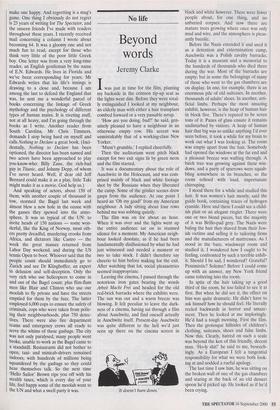No life
Beyond words
Jeremy Clarke
Iwas just in time for the film, planting my backside in the crimson tip-up seat as the lights went dim. Before they were total- ly extinguished I looked at my neighbour, an elderly man with either a hair transplant combed forward or a very passable syrup.
`How are you doing, bud?' he said, gen- uinely pleased to have a neighbour in an otherwise empty row. His accent was unmistakably that of a working-class New Yorker.
`Musn't grumble,' I replied cheerfully.
Then the auditorium went pitch black except for two exit signs lit by green neon and the film started.
It was a documentary about the role of Auschwitz in the Holocaust, and was com- prised mainly of black and white footage shot by the Russians when they liberated the camp. Some of the grislier scenes drew gasps from the audience. At one point I heard an 'Oh my gaad!' from my American neighbour. A lady sitting about four rows behind me was sobbing quietly.
The film was on for about an hour. When it was over and the lights went up the entire audience sat on in stunned silence for a moment. My American neigh- bour looked desolate, as if he had been fundamentally disillusioned by what he had just witnessed and needed a moment or two to take stock. I didn't therefore say cheerio to him before making for the exit. After watching that lot, social pleasantries seemed inappropriate.
Leaving the cinema, I passed through the notorious iron gates bearing the words Arbeit Macht Frei and headed for the old red-brick barracks where the exhibits were. The sun was out and a warm breeze was blowing. It felt peculiar to leave the dark- ness of a cinema, having sat through a film about Auschwitz, and find oneself actually in Auschwitz itself. Present-day Auschwitz was quite different to the hell we'd just seen up there on the cinema screen in 'It doesn't burn down.' black and white however. There were fewer people about, for one thing, and no unburied corpses. And now there are mature trees growing where once was only mud and wire, and the atmosphere is pleas- antly bucolic.
Before the Nazis extended it and used it as a detention and extermination camp, Auschwitz was a Polish cavalry barracks. Today it is a museum and a memorial to the hundreds of thousands who died there during the war. Most of the barracks are empty; but in some the belongings of many of those who went to the gas chambers are on display. In one, for example, there is an enormous pile of old suitcases. In another, thousands of adults' shoes. In another, arti- ficial limbs. Perhaps the most amazing exhibit, however, is the heap of human hair in block five. There's reputed to be seven tons of it. Panes of glass ensure it remains undisturbed by visitors. A heap of human hair that big was so unlike anything I'd ever seen before, it took a while for my brain to work out what I was looking at. The room was empty apart from the hair. Somebody had opened the windows at the far end and a pleasant breeze was wafting through. A birch tree was growing against these win- dows, and a party of sparrows were squab- bling somewhere in its branches, so the room echoed with loud, importunate chirruping.
I stood there for a while and studied this hair. It was women's hair mostly, said the guide book, containing traces of hydrogen cyanide. Here and there I could see a child- ish plait or an elegant ringlet. There were one or two blond pieces, but the majority of it was Brillo-pad grey. The Nazis were baling the hair they shaved from their Jew- ish victims and selling it to tailoring firms and the manufacturers of mattresses. As I stood in the bare, windswept room and studied it, 1 wondered how I ought to be feeling, confronted by such a terrible exhib- it. Should I be sad, I wondered? Grateful? Pessimistic? Solemn? Before I could come up with an answer, my New York friend came tottering into the room.
In spite of the hair taking up a good third of the room, he too failed to see it at first. But when he did see it, the effect on him was quite dramatic. He didn't have to ask himself how he should feel. He literally reeled backwards in horror and amaze- ment. Then he looked at me imploringly. He'd had a tough morning. First the film. Then the grotesque hillsides of children's clothing, suitcases, shoes and false limbs. Now this. Clearly, hatred on such a scale was beyond the ken of this friendly, decent man. 'Ho-ly shit!' he said to me, beseech- ingly. As a European I felt a tangential responsibility for what we were both look- ing at and nodded a rueful apology.
The last time I saw him, he was sitting on the broken wall of one of the gas chambers and staring at the back of an old dessert spoon he'd picked up. He looked as if he'd been crying.


































































 Previous page
Previous page